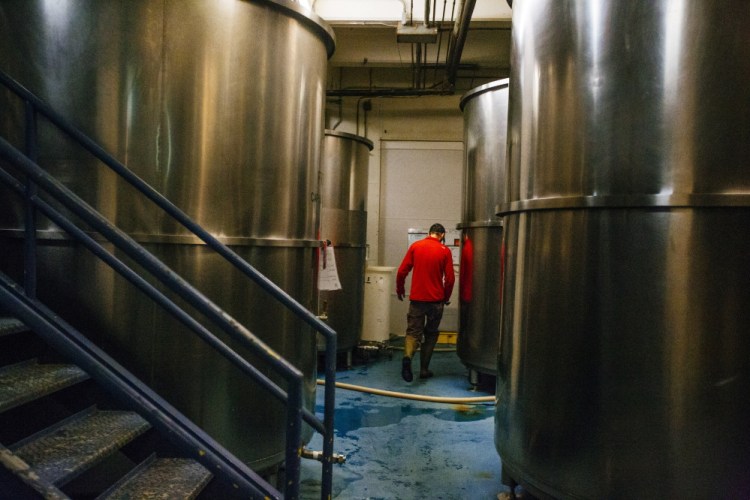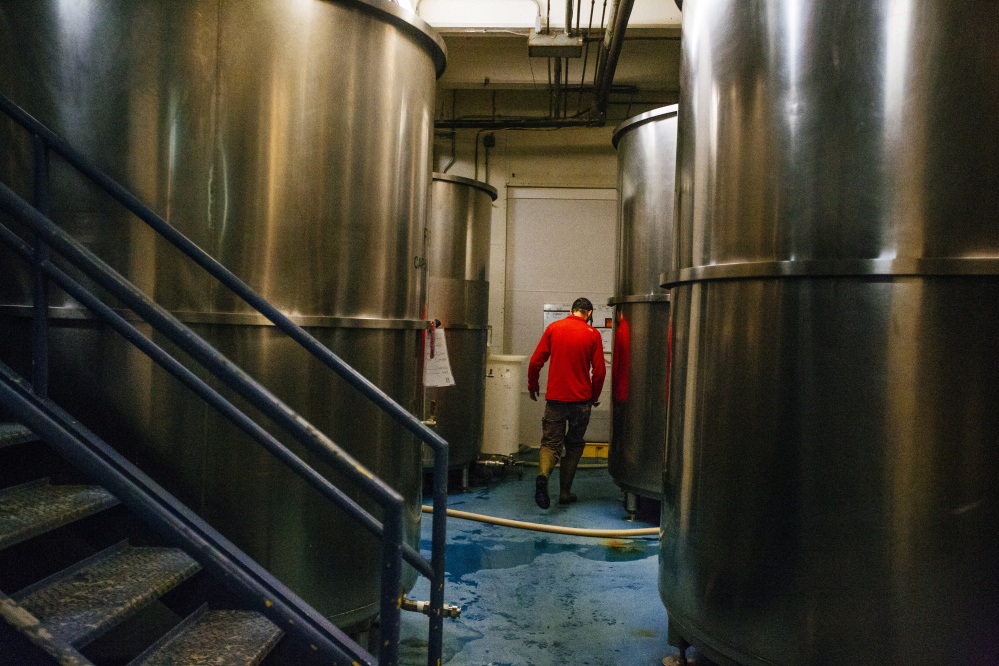The Maine Legislature could soon make it easier for new brewers to break into the state’s growing craft beer market.
Sen. Justin Alfond, D-Portland, has introduced a bill that would allow large breweries with excess production capacity to form tenant agreements with as many as nine smaller beer companies to lease brewing time on their equipment – large brewers can host only one tenant brewery now. The arrangements would lower overhead costs for host brewers and reduce taxes for tenants.
If the bill becomes law, more small breweries could obtain “alternating proprietorship” status, a technical designation that for federal tax purposes would allow their product to be taxed at a lower rate for all production up to 60,000 barrels a year.
The bill, L.D. 102, “An Act to Strengthen the Craft Beer Industry,” was requested by Shipyard Brewing Co., which for six years has hosted Peak Organic Brewing as a tenant brewer at its plant in Portland.
There are now 61 licensed breweries in Maine, up from 35 two years ago, and industry advocates expect as many as a dozen more to open in 2015.
Other states already have more relaxed rules on collaborative relationships between breweries, said Jon Cadoux, founder of Peak Organic Brewing. “This does not make us a forerunner or an innovator by any means,” he said. “It’s a game of massive catch up. The bottom line here is, this is an extremely common practice.”
Under Maine’s current law, a brewer may host only one tenant brewer with “alternating proprietorship” status. Because of the law, Shipyard has had to turn down at least two small brewers that were interested in leasing time on Shipyard’s equipment, said Brandon Mazer, general counsel for Shipyard Brewing Co., during a hearing on the bill Wednesday in Augusta. One of the brewers, Mazer said, has since set up shop out of state.
In alternating proprietorship arrangements, the smaller brewers provide their own ingredients and staff, then use the host brewer’s fermenting, bottling and packaging equipment. They ship their products to customers, who are unaware that the hosting brand has anything to do with the tenant brand.
For breweries that produce beer using their own equipment, like Shipyard, the federal government levies a tax of $7 per barrel for the first 60,000 barrels annually, and $18 for every barrel after that.
Before Maine allowed tenant brewers, companies like Peak Organic had to contract with larger brewers to essentially make their beer for them. The number of barrels produced for each tenant brewer would be counted toward the host brewer’s 60,000-barrel limit and help push the host brewery into the higher tax rate.
Under alternating proprietorship, smaller brewers get their own federal brewing licenses, and can produce as many as 60,000 barrels at the lower tax rate no matter where the beer is brewed, or with whose equipment. The tenant brewer does not contribute to the taxable production of the host brewery.
Shipyard’s brewing schedule lends itself to leasing its equipment, Mazer said. From roughly October through April, the brewery’s operations slow down considerably, and many staffers shift from brewing to maintenance and upkeep.
Advocates for the bill said it would benefit both small producers that want to lower their capital expenses and larger breweries that want to lower their overhead by leasing time on brewing equipment that would otherwise be idle.
“We think that rising tide lifts all boats,” Mazer said. “It helps our economy and it helps our overhead.”
No one spoke in opposition to the bill at Wednesday’s hearing.
Copy the Story LinkSend questions/comments to the editors.





Success. Please wait for the page to reload. If the page does not reload within 5 seconds, please refresh the page.
Enter your email and password to access comments.
Hi, to comment on stories you must . This profile is in addition to your subscription and website login.
Already have a commenting profile? .
Invalid username/password.
Please check your email to confirm and complete your registration.
Only subscribers are eligible to post comments. Please subscribe or login first for digital access. Here’s why.
Use the form below to reset your password. When you've submitted your account email, we will send an email with a reset code.